"SECRECY: THE EINSTEIN FILE BY FRED JEROME. Most
physicists carry around in their heads a collection of Einstein anecdotes, such
as his response to a reporter who asked: 'Will they ever invent an anti-gravity
machine?' 'They already have,' Einstein solemnly replied, 'its called an
elevator.' But, The Einstein File: J. Edgar Hoover's Secret War
Against the World's Most Famous Scientist paints a picture of an Einstein of
whom most scientists have been only vaguely aware: Einstein the astute
politician and passionate civil rights champion. Fortunately, Fred Jerome waged
his own two-year war in the courts to make the Freedom of Information Act (FOIA)
do what it was meant to do. The government was compelled to release a
less-censored copy of Einstein's 1500 page FBI file. In the McCarthy era,
Einstein saw reflections of the fascism he fled Germany to avoid. In today's
developing climate of secrecy, scientists may see reflections of the Einstein
file."
In addition, it would have the advantage of retaining
undergraduate universities, at least, within reasonable access of the rural
communities that several of them serve. Staff at these institutions could
develop collaborative research programmes with established research
universities, in a similar manner to the way that college staff do in the United
States. If this were to happen, then researchers at these universities need not
be denied the opportunity to continue with research, even if their universities
were designated as undergraduate colleges.
Were Australia to adopt such a model, and were the Federal government not to use
the approach as an excuse for further parsimony, there would be a real
likelihood of developing the world class universities and housing increasing
numbers of outstanding researchers and mentors to foster the leaders in science,
engineering and the humanities needed to not merely maintain our present
position in the OECD pecking order but to move into the top quarter. But no
amount of reorganisation per se will obviate the fact that our university
and research sectors require an injection of resources comparable to that
envisaged by the European Union. 1.4% of Australian GDP is not competitive with
the 3% designated by the EUs heads of government this past March.
MIND THE GAP - it's widening
Purposes of higher education
inspire and enable individuals to develop their capabilities to
the highest potential throughout their lives (for personal growth and
fulfilment, for effective participation in the workforce and for constructive
contributions to society),
advance knowledge and understanding,
aid the application of knowledge and understanding to the benefit
of the economy and society,
enable individuals to adapt and learn, consistent with the needs
of an adaptable knowledge-based economy at local, regional and national levels
and
enable individuals to contribute to a democratic, civilised
society and promote the tolerance and debate that underpins it.
University revenues
KERRY O'BRIEN: I still find it hard to believe that there
are so many Australians across so many branches of the industry who have really
made it to the top in the United States -- actors, directors, cinematographers,
sound.
You might think if that's what underpins Australian international success and
acclaim in the performing arts adequate support ought to be on the public agenda
for the core of all modern science. Think again. Last week the Australian
Mathematical Society released
Mathematical
Sciences in Australia: Still Looking for a Future
The Minister for Science, Peter McGauran
announced on May 2nd "a major initiative to develop a set of
national research priorities." Setting research priorities properly undertaken
is certainly desirable but it would seem wise to have solid foundations in order to
successfully implement your decisions, and that includes competent individuals
adequately resourced. Otherwise, setting priorities and promulgating numerous
discussion papers will be so much expensive eyewash.
Australia's universities require substantial change to the
present arrangements for funding and regulation. The Minister, Dr Nelson, has
set in train a review of higher education to identify the necessary package of
changes through his statement Higher Education at the Crossroads.
Last night the Treasurer made a feature of the Intergenerational Report, which
looks at the shape of Australia in
A recent example is the Minister for Education, Science and Training, Dr.
Brendan Nelson, using the fact that Australia "has seven Nobel Prizes" as an
example of our excellence. Nobel Prizes were first awarded in 1901.
A few comparisons: the numbers are determined using the
Nobel e-Museum website: New Zealand
2, Israel (nation founded in 1948), 3; Australia, 7; Canada, 14; Netherlands,
16; Switzerland, 27; France, 48; Germany, 88; Great Britain, 92; USA, 190. So Australia's record in the Nobel Laureate stakes isn't bad, but neither does
it give us bragging rights. Certainly it is true that not until the end of
the Second World War did Australian universities attain the status where they
might be expected to sustain research in the "enabling sciences" able to gain the attention of Nobel
committees. But half a century has passed and no Australian chemist or physicist
working in Australia has been recognised.
The entire economy of the United States, as measured by gross
domestic product (GDP), adjusted for inflation, increased an estimated 2.7
percent in 1998, 3.8 percent in 1997, and 2.8 percent in 1996. Consequently, R&D
as a share of GDP will reach 2.61 percent in 1998, up from 2.54 percent in 1997,
and 2.57 percent in 1996. This 1998 share is the highest since 1992's 2.64
percent, and reflects a continuation of a general upturn that began in 1994
after a three-year decline from 1991-94 (figure 1). Despite this recent
increase, the R&D share is still below levels reached in the early 1990s. The
historic high since 1957 for the Nation's R&D/GDP ratio was reached in 1964 at
2.87 percent; the low was 2.12 percent in 1978.
Of the projected $220.6 billion spent on R&D in 1998, $34.4
billion (or 15.6 percent) is expected to be for basic research, $49.8 billion
(22.6 percent) for applied research, and $136.4 billion (61.8 percent) for
development. In comparison with 1997, R&D performance in 1998 reflects a
2.4-percent "real" (adjusted for inflation) increase in basic research, a
6.2-percent real increase in applied research, and a 5.8-percent real increase
in development.
Once upon a time in Australia, we had special bodies between the government and
the
Perhaps it ought to be considered the start of a "disaster recovery plan." [See
the May 9th Editorial.]
Need a zero-volume bottle?
And yes he's on the level. You can order and will receive a
Klein bottle; they come in assorted shapes, sizes and prices. He also
manufactures a knitted "Klein Bottle Hat - for the zero volume head." TFW
has no commercial interest in AKB but believes that truly imaginative
entrepreneurship oughtn't to go unnoticed. However, you'll have to find your own
way to obtaining details for purchasing.
Yesterday, Senator Carr opened an opinion
piece published in the
Sydney
Morning Herald with his hyperbolic précis of the Department of
Education, Science and Training's (DEST) discussion paper:
Certainly DEST's paper is verbose,
superficial and bias, and the 22 person Reference Group it proposes is unwieldy
and lacks balance, but Senator Carr's diatribe is unconstructive and a blatant
attempt at populist political point scoring. So much for Professor Gilbert's
plea. The shadow minister is over five months in the job and by this time he and
his staff should have developed some constructive contributions to the debate on
what to do for and with higher education. There is no evidence of such activity
from the Senator's op-ed piece. Previously, Dr. Nelson had unhelpfully
commented:
[Australian Universities are] likely to have revenues this year
in the order of $10.4 billion, $6.1 billion of which will be taxes often removed
from low-income families who are still struggling to understand the importance
of higher education for the future of the country.
The senator, not to be outdone in the populist point scoring stakes, writes: Perhaps most damaging, and least
understandable, is the plan to single out two universities for premium
funding for teaching and research - to set them up as world institutions.
This blatantly elitist plan will be underwritten by the remaining 36 public
universities, the ones that produce our teachers, engineers, IT
professionals and accountants, our social workers and performing artists. At
what social, economic and cultural price is this goal to be achieved? At
whose expense?
Interesting isn't it that the former minister for science in the Hawke
Government, former President of the Labor Party and overseer of Labor's
Knowledge Nation, Barry Jones, in speaking at Melbourne University recently
said:
A turning point in the history of Australia's higher education
was the comprehensive reorganisation that was initiated, and indeed imposed,
from 1987 by John Dawkins, Bob Hawke's minister for education and training. I
have little doubt that Dawkinisation will prove to have been the greatest single
mistake of the Hawke-Keating years.
One might be forgiven for concluding that neither major political party is
interested in revitalising a university system that has been deemed to be in
very serious difficulties if it entails significant additional allocation of
resources.
![]() Those Einstein Files.
(May 25, 2002)
Those Einstein Files.
(May 25, 2002)
Christy Ann Fernandez, filling in for Bob Park on What's
New, placed the following item in today's column. One wonders how the great theoretical physicist would have fared in today's Australia.
![]() Challenges to Australian and
South African Higher Education -- Shadows of Similarity. (May 23, 2002)
Challenges to Australian and
South African Higher Education -- Shadows of Similarity. (May 23, 2002)
While the Minister for Education,
Science and Training, Brendan Nelson, is furthering deliberations on which road
Australia's system of higher education should take, South Africa is also coming
to grips with revising the make up of its higher educational structure.
Currently, the South African cabinet is considering a proposal which has been
years in the gestation -- to merge its 21 universities and 16 technikons
(polytechnics, similar to our former
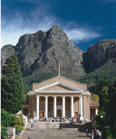 colleges
of advanced education) into 21 institutions. Most of South Africa's historically
white institutions have made significant progress toward becoming nonracial. But
what's now the best way to upgrade the black universities and technikons, which
were predominately set up during the apartheid era for various ethnicities.
Seven of the current universities would remain unaltered. Twelve of the proposed
14 new institutions would involve mergers between historically black and
historically white ones; the other two would be between historically black
institutions, which in many cases would involve establishments geographically
isolated from one another as well as having quite disparate academic cultures.
colleges
of advanced education) into 21 institutions. Most of South Africa's historically
white institutions have made significant progress toward becoming nonracial. But
what's now the best way to upgrade the black universities and technikons, which
were predominately set up during the apartheid era for various ethnicities.
Seven of the current universities would remain unaltered. Twelve of the proposed
14 new institutions would involve mergers between historically black and
historically white ones; the other two would be between historically black
institutions, which in many cases would involve establishments geographically
isolated from one another as well as having quite disparate academic cultures.
This proposal is not the first approach suggested to the
South African government. In 2000 a taskforce put forward a plan to place the
universities and technikons into three categories: those permitted to award
degrees up to PhDs, those that could award up to masters degrees and only in
certain fields, and those that could award only undergraduate degrees. The black
universities in particular were wary of this plan fearing they would all be
placed into the third group. But such a plan would allow the institutions to
retain their identity. And such an approach might well be a model to rectify the
decimation of Australia's higher education system which resulted from its
Dawkinisation by Labor as well as the progressive reduction in government
support by the current Coalition government.
As Nature points out in its May 23rd editorial
on the challenge facing the South African government,
![]() Determining Australia's
Research Priorities. (May 22, 2002)
Determining Australia's
Research Priorities. (May 22, 2002)
On May 2nd the Department of Education, Science
and Training issued a joint
media
release by its two ministers announcing "a major initiative to develop a
set of national research priorities." The senior minister, Dr. Nelson said,
"Specifically we will now be asking the science bodies and organisations to
consult with their members in the months ahead to decide their preferred
priorities, underpinned by a vision of where they believe Australia should
position itself in the future." The science minister, Mr. McGauran, added, "a
key step in the national priority setting process will be the formation of a
high-level consultative panel... An
Issues Paper![]() will be released
for public comment in the next few weeks."
will be released
for public comment in the next few weeks."
That 47 page paper is now available along with a list of the
nine member
consultative committee to be chaired by the Chief Scientist Dr. Robin
Batterham. The timetable issued by DEST states that the "consultative panel"
will accept submissions from the beginning of June. A specific web site for the
prioritising undertaking is online
![]() .
.
The Issues Paper which gives details for forwarding
submissions by June 28th is an interesting and in some ways a
remarkable document to be released by the Department. It acknowledges in several
places the importance of basic research, but that said the makeup of the
consultative panel deserves close scrutiny as well as "An
illustration... of the summary
information for a possible nomination." (Issues Paper, p.15)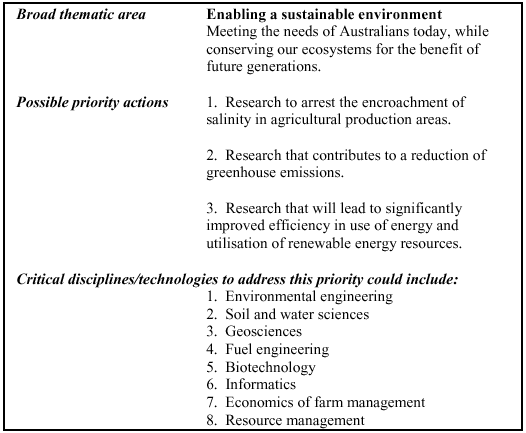
![]() As Long as the Price is
Right. From the Department of Education, Science and Training's
Higher Education Report for the 2002 to 2004 Triennium. (May 21, 2002)
As Long as the Price is
Right. From the Department of Education, Science and Training's
Higher Education Report for the 2002 to 2004 Triennium. (May 21, 2002)
The Government regards higher education as contributing to the fulfilment of
human and societal potential, the advancement of knowledge and social and
economic progress. The main purposes of Australian higher education are to:
Two indicators of the improving responsiveness of universities are the amount
and proportion of revenue derived from non-government sources. Institutions
diversifying their income sources are likely to be responding to wider economic
needs and better servicing their communities.
Total university revenues are expected to reach the record
level of an estimated $10.4 billion in 2002, up from an estimated $9.9 billion
in 2001 and $7.9 billion in 1996. This trend is expected to continue over the
triennium with total revenue for the higher education sector projected to reach
$10.9 billion (in 2002 price levels) by 2004. The share of total university
revenue consisting of Commonwealth payments will continue to decrease, from
around 69 per cent in 1996 to a projected 61 per cent in 2004. This changing
share is due to growth in non-government revenue. The level of Commonwealth
government revenue provided to universities has continued to increase in recent
years due to the growth of fully funded domestic student places and the
indexation of grants. (Italics ours)
![]() Is Europe Serious About
Becoming Competitive With The US as Regards Research and Development? (May
19, 2002)
Is Europe Serious About
Becoming Competitive With The US as Regards Research and Development? (May
19, 2002)
The Belgian representative on the European Commission,
Philippe Busquin, is also Commissioner for the European Research Area. His
proposal that the EU should increase its investments in research and development
 up
to 3% of GDP by 2010 has been endorsed by the European Council of heads of state
and government held in Barcelona on 15 and 16 March this year. This was followed
in April by a panel of 70 experts in science and science policy representing
most European Union Member States and Estonia who met in Stockholm to discuss
the future directions of EU science policy. They emphasised the need for
significant changes in science policy within the EU and stressed that more
EU-funding needs to be directed towards basic research. "It is important to
create conditions under which new discoveries can be made, innovative solutions
found and long-term technical, scientific and social progress achieved."
According to the panel, there has been an over-emphasis on funding for
mission-oriented research and development.
up
to 3% of GDP by 2010 has been endorsed by the European Council of heads of state
and government held in Barcelona on 15 and 16 March this year. This was followed
in April by a panel of 70 experts in science and science policy representing
most European Union Member States and Estonia who met in Stockholm to discuss
the future directions of EU science policy. They emphasised the need for
significant changes in science policy within the EU and stressed that more
EU-funding needs to be directed towards basic research. "It is important to
create conditions under which new discoveries can be made, innovative solutions
found and long-term technical, scientific and social progress achieved."
According to the panel, there has been an over-emphasis on funding for
mission-oriented research and development.
Science's Richard Stone, reporting from Stockholm
wrote, "You know scientists are desperate when they clamor for new bureaucratic
paws on the R&D purse strings. But rampant dissatisfaction with Europe's basic
research strategy--or lack thereof--has sparked calls for a new grant-making
body to fill the void. At [the] meeting here last week, the continent's top
science managers started to flesh out a proposal for a European Research Council
(ERC). It may not be what many scientists were hoping to see, but it does
reflect budgetary constraints and the reality of the European Union's Byzantine
politics."
The next overt act in the drama will be acted out in
Copenhagen on October 7,8. The Conference is being organised by the Danish
Research Councils during the Danish Presidency of the European Union is entitled
Towards a European Research Area: Do we need a European Research Council?
It will address such matters as the overwhelming part of Europe's research
funding is dispensed at the national level. The question is should national
research councils and similar funding agencies consider intensifying mutual
collaboration and strategic co-ordination, e.g. by networking and
opening-up national research programs.
The
first announcement of the conference![]() states, "The concept of the [European Research Area] ERA, and the challenge of
coordinating and opening-up national funding sources, gives further impetus to
the debate on whether European science would benefit from the creation of an
independent public funding structure for high-quality research at the European
level -- i.e. the creation of one or several European Research Councils (ERC).
The purpose would be to increase the scope for collaboration and competition,
providing national research systems with the creative stimulus of a common
quality benchmark. The conference will contribute to the debate on the
desirability of ERC by bringing together high-level representatives of
governments, the scientific community and the Commission to discuss and clarify
the pros and cons of the issue."
states, "The concept of the [European Research Area] ERA, and the challenge of
coordinating and opening-up national funding sources, gives further impetus to
the debate on whether European science would benefit from the creation of an
independent public funding structure for high-quality research at the European
level -- i.e. the creation of one or several European Research Councils (ERC).
The purpose would be to increase the scope for collaboration and competition,
providing national research systems with the creative stimulus of a common
quality benchmark. The conference will contribute to the debate on the
desirability of ERC by bringing together high-level representatives of
governments, the scientific community and the Commission to discuss and clarify
the pros and cons of the issue."
So just where does this leave Australia? What impact will or
should these initiatives have on the reviews of higher education
and research priorities being undertaken by the Ministers for Education Science
and Training, Brendan Nelson, and Science, Peter McGauran? The European Union
has been mulling over what to do for and with research and development since the
Lisbon conference in March 2000. The increasing gap between the United States
and Europe in research and development, and the particular perception that
Europe is falling further behind in curiosity driven research is causing
increasing concern and the perception is gaining ground that as a result the
European's quality of life will diminish. If that is a legitimate concern,
Australia would appear to be in similar strife, and the matter of Australia
joining in a consequential research and development consortium ought to be
actively pursued. However, to do so seriously will require that we are seen to
be in a position to bring sought-after bargaining chips to the table.
![]() Mathematics and the
Performing Arts. (May 17, 2002)
Mathematics and the
Performing Arts. (May 17, 2002)
Profound and succinct observations can come from unexpected
quarters. Kerry O'Brien, hosting the ABC's 7:30 report last night was
interviewing the film and television actor Rachel Griffiths -- asking the usual
questions concerning her road to success. Nothing particularly out of the
ordinary in the banter until the following segment:
I saw We Were Soldiers the other day and watching the
screen credits, there's Dean Semler's name. The list just seems to be
extraordinarily long now.
Why?
RACHEL GRIFFITHS: Investment, investment, investment.
I get so peeved with the kind of - the Australian media has this kind of
obsession with making something magic out of this. It's like, "What's in our
water or what amazing innate thing is it?"
And it's...
KERRY O'BRIEN: Money.
RACHEL GRIFFITHS: It's public funding. If
you look at where those people went to school, there's just nothing magic about
it Our training is impeccable, and the opportunities, and I fear that these
opportunities are shrinking, because when I came out of drama school I did a
year of kind of fringe theatre, where I was on the dole, and I did the odd work
- paid bit of work when I could get it - but I was dedicated to being an actor
and I wanted to put the time into that, and then I had two years with a
subsidised theatre company that toured around regional Victoria to schools. We
worked our butts off five days a week, performing three shows a day, and that
was Victorian funding and federal funding.
So for two years it was like this amazing apprenticeship. By
the time I had my first screen test I was ready, on fire, to go. If
those opportunities hadn't have been there, I don't know if I would have ever
really consolidated myself as an actor and I don't know if
the opportunity came if I would have been able to nail it like I did on
Muriel's Wedding.![]() ,
an update to the critically documented "Occasional
paper"
,
an update to the critically documented "Occasional
paper"![]() published by
the Federation of Scientific and Technological Societies in October, 2000. Jan
Thomas, author of both papers has been plainspoken in stating that the draining
of mathematical talent analysed in the original article continues unabated while
concurrently, "Australia now has a reputation
overseas as a country that doesn't value its mathematical scientists. Combined
with poor salaries, one of the worst staff-to-student ratios of any discipline,
and the lack of any special initiatives to address the need for mathematics and
statistics in new and emerging areas, there is little to attract good people
from overseas." In agreement, Melbourne University Professor of Mathematics and
incoming president of the Australian Mathematical Society, Tony Guttmann, also
pointed out that there needs to be a national effort to strengthen the
mathematical sciences now. Australia is playing catch-up with New Zealand where
a Mathematical Sciences Institute was recently announced and Singapore which has
had one since July 2000.
published by
the Federation of Scientific and Technological Societies in October, 2000. Jan
Thomas, author of both papers has been plainspoken in stating that the draining
of mathematical talent analysed in the original article continues unabated while
concurrently, "Australia now has a reputation
overseas as a country that doesn't value its mathematical scientists. Combined
with poor salaries, one of the worst staff-to-student ratios of any discipline,
and the lack of any special initiatives to address the need for mathematics and
statistics in new and emerging areas, there is little to attract good people
from overseas." In agreement, Melbourne University Professor of Mathematics and
incoming president of the Australian Mathematical Society, Tony Guttmann, also
pointed out that there needs to be a national effort to strengthen the
mathematical sciences now. Australia is playing catch-up with New Zealand where
a Mathematical Sciences Institute was recently announced and Singapore which has
had one since July 2000.
![]() He Talks Tough, and Knows
What He's Talking About. (May 16, 2002)
He Talks Tough, and Knows
What He's Talking About. (May 16, 2002)
Donald Kennedy, 71, former US Food and Drug Administration
czar, former president of Stanford University, and current editor-in-chief of
Science doesn't always contribute the journal's editorial, but when he does
you're in no doubt where he's coming from. In the May 10th issue he
takes the Bush administration to task for dragging its feet in making key
appointments. "A year and 3 months in office went by before the Bush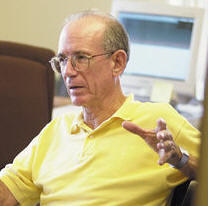 administration finally found a Surgeon General and a director for the National
Institutes of Health (NIH), and half a year before it appointed a Science
Adviser to the President. Still among the missing, however, is a commissioner
for the Food and Drug Administration... At difficult times in the past, we have
learned to look to the U.S. Congress for solace, and the substantial improvement
in the budget for NIH was indeed good news. But, as argued in this space earlier
in the budget negotiations, a balanced science portfolio is more important than
ever, and how the National Science Foundation and other agencies will fare is
uncertain. That is because those budgets are hostage to a forthcoming allocation
decision that will determine how much discretionary money (that is, dollars not
committed to obligatory payments such as interest and welfare) will be available
for purposes other than defense."
administration finally found a Surgeon General and a director for the National
Institutes of Health (NIH), and half a year before it appointed a Science
Adviser to the President. Still among the missing, however, is a commissioner
for the Food and Drug Administration... At difficult times in the past, we have
learned to look to the U.S. Congress for solace, and the substantial improvement
in the budget for NIH was indeed good news. But, as argued in this space earlier
in the budget negotiations, a balanced science portfolio is more important than
ever, and how the National Science Foundation and other agencies will fare is
uncertain. That is because those budgets are hostage to a forthcoming allocation
decision that will determine how much discretionary money (that is, dollars not
committed to obligatory payments such as interest and welfare) will be available
for purposes other than defense."
There's more, but you get the idea. Perhaps it's too much to
hope for, but it would a breath of fresh air: 1, were leading members of our
parliament as supportive of science as various key members of the US Congress
and 2, if Australians with clout comparable to that of Kennedy made their voices
heard in support of Australian science and higher education. One thing is
certain, it will take more than a one off from Rupert Murdoch to dent the
Federal Cabinet's defensive shield.
![]() The 2002/03 Budget as
Regards Higher Education, Research and Development Holds the Sector Static.
(May 15, 2002)
The 2002/03 Budget as
Regards Higher Education, Research and Development Holds the Sector Static.
(May 15, 2002)
The budget's good news was that higher education, research
and development didn't get spear tackled. The bad news is that it's being kept
marching on the spot while our cohort nations, despite the Treasurer, Peter
Costello, pointing out that we are in excellent financial health and they're in
recession, keep upping the ante. And just in case you've forgotten one case in
point:
the "Canada
Research Chairs Infrastructure Fund... offers research and salary support
for outstanding researchers, beginning in fiscal year 2001. It is expected that
there will be 2000 chairs by 2005. Excellence in research is of paramount
importance in the selection of chair holders. Chairs will be in priority areas
identified by universities in their strategic research plans.
In their nominations, universities have the opportunity to
include a request for infrastructure support from
the Canada Foundation for Infrastructure."
On a per capita basis Australian universities would have 1300
chairs similarly funded by 2005. It's not going to happen.
Meanwhile, the Chairman of the Australian Vice-Chancellors'
Committee, Professor Deryck Schreuder, has made the
following observation:
It would be most premature for the Government to make
structural changes in this budget or worse still to have announced cuts to
funding. Instead the whole sector will be looking to the review to produce a
substantial, well considered, package of changes in the 2003 budget including
additional public investment in our universities.
What the sector desperately needs is a policy strategy to
achieve the national goals for universities of high levels of education, high
quality innovative research and strong international interaction. This is best
done through supporting all universities to achieve their distinctive, diverse
missions in a pluralistic system.
At present every Australian university is under strain and
needing support to sustain quality. We will need a number of paths forward for
universities to choose from. If one thing is clear it is that there is no single
solution to the challenges before Australia's universities.
The cold fact remains, Australia currently earmarks 1.4% of
its GDP for research and development, the OECD average is just over 2% while the
EU have made a commitment to move their
R&D budgets to 3% by the end of the
decade. There is no indication that our governmental leaders comprehend the
enormity the effect of the growing gulf of support for our universities and
research -- basic, strategic and applied -- will have on the population's well
being.
![]() The Number is Seven; Would
You Like to Try for Eight? (May 14, 2002)
The Number is Seven; Would
You Like to Try for Eight? (May 14, 2002)
One of the more distasteful public habits of those in charge of government is
to proffer statistics which support rather than illuminate. Along with this
convention is the tendency to avoid meaningful comparisons.![]() The
most recent, Peter Doherty, received his prize
for work done at the ANU from 1973-75. For many years he has been a permanent staff
member of St. Jude Children's Research Hospital in Memphis, Tennessee.
The
most recent, Peter Doherty, received his prize
for work done at the ANU from 1973-75. For many years he has been a permanent staff
member of St. Jude Children's Research Hospital in Memphis, Tennessee.
Glancing at the list below, three of the seven were awarded their prizes
for work done in Great Britain and no prize has been awarded to an Australian in
either physics or chemistry for work done within our borders.
Who
When Awarded
Prize
Country where worked
BRAGG, Sir WILLIAM LAWRENCE
1915
Physics
Great Britain
CORNFORTH, Sir JOHN
1975
Chemistry
Great Britain
FLOREY, Lord HOWARD
1945
Physiology or Medicine
Great Britain
BURNET, Sir MACFARLANE
1960
Physiology or Medicine
Australia
ECCLES, Sir JOHN
1963
Physiology or Medicine
Australia
DOHERTY, PETER
1996
Physiology or Medicine
Australia
WHITE, PATRICK
1973
Literature
Australia
Whether or not Australia can produce men and women with the potential of
doing outstanding scientific research is not the the issue. The fact that there
is little evidence that we have provided the milieu to do so is.
![]() Research and Development
Budgets Here and the US. (May 12, 2002)
Research and Development
Budgets Here and the US. (May 12, 2002)
While Australia's R&D budget as a proportion of GDP remains
static at about 1.4% and is expected to remain so or even decline until 2005 if
the present funding regime continues. Below is a quote from figures published by
the US National
Science Foundation (NSF) which relates R&D expenditure as a percentage of
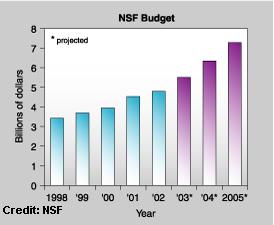
National Science Foundation Authorization Act of 2002 (H.R.4664)![]() , which Bob Park
of the American Physical Society reports, "would provide a 15 percent increase
in the NSF budget next year and put it on track for doubling in five years. This
is a major achievement, made possible by the cooperation of the academic and
industrial communities. The bill has a long way to go, and it is only an
authorization. Any money must still be appropriated. Nevertheless, it's an
essential first step and appears to have strong support in the House. The
doubling of the NIH budget, which is expected to be completed this year, began
the same way."
, which Bob Park
of the American Physical Society reports, "would provide a 15 percent increase
in the NSF budget next year and put it on track for doubling in five years. This
is a major achievement, made possible by the cooperation of the academic and
industrial communities. The bill has a long way to go, and it is only an
authorization. Any money must still be appropriated. Nevertheless, it's an
essential first step and appears to have strong support in the House. The
doubling of the NIH budget, which is expected to be completed this year, began
the same way."
Note that the current NSF budget is US$4.8 billion. Were that
to be doubled it would be the equivalent on a population basis of A$1,230
million. Current Australian Government plans are to boost the ARC's budget to
$738 million by 2005/06.
Following is the quote from National Science Foundation data
brief NSF 99-302, October 16, 1998. The NSF also notes that, "In 1998,
Federal support for R&D is expected to grow slightly in real terms, but
continues to shrink as a proportion of the Nation's funding total."
However, the proportions of basic research in the academic, federal and
industrial sectors have remained almost constant.
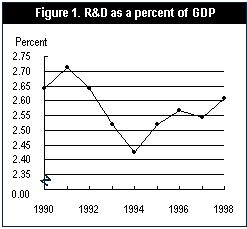
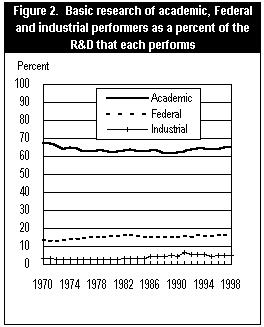
![]() "Don't Think, Just Count
the Beans" -- Is Not Good Enough. A Bedtime Story from the Departing
President of the Australian Academy of Science. (May 10, 2002)
"Don't Think, Just Count
the Beans" -- Is Not Good Enough. A Bedtime Story from the Departing
President of the Australian Academy of Science. (May 10, 2002)
Last week Brian Anderson's farewell presidential
address to the Fellows of the Australian Academy of Science closed with the
following admonition.

It has also led to the use of a formulaic approach to funding which Lord Robert
May, one of our Fellows... and currently President of the Royal Society,
described as "daft". As you know, if University A produces two PhDs who go to
MIT and Oxford as postdocs, and University B produces four who get jobs as taxi
drivers, University A receives half the money that University B receives. And if
University A has a professor who wins a Nobel prize and writes two papers, and
University B has a professor who writes four papers, even four papers in a
journal with very low impact factor, University A again gets half the money. It
may sound very simple for universities to feed a bunch of numbers into a
government computer, and have that computer print the cheque for the minister to
sign, and it may mean that the salaries expended on directly supervising the
university sector are at a record low in real terms. But it does not mean
that the expenditure on the university sector is the wiser for it, or the
country is better off. We must ensure that in the future, whether or not the
university sector is to be run from a single government department rather than
at least in part being returned to the States, that government department is not
allowed to metaphorically stuff its fingers in its ears, and to use mechanistic
formulae for funding which produce counterproductive behaviour in the
universities.
Fellows of the Academy are blessed with a formidable array of talents. Many of
them accept the challenge to put themselves at the disposal of their colleagues
and fellow citizens. There is a particular challenge in front of us all at the
moment, and that is to produce a set of outcomes in the forthcoming debate on
universities which will not disenfranchise the less talented, the less
politically astute, the less vocal and so on. Rather, we must be seeking the
right outcome for all of Australia. But the right outcome does include a system
that recognises, sustains and indeed rewards individual and institutional
excellence, to a significantly greater degree than we have seen in recent years.
![]() If All Else Fails, There's
Always the Klein Bottle.
(May 7, 2002)
If All Else Fails, There's
Always the Klein Bottle.
(May 7, 2002)
 When
an astronomer takes over systems management of a departmental computing system,
noses into a 75 cent accounting discrepancy, becomes obsessed with finding the
reason, uncovers an international hacking spy ring and writes a bestseller about
his "escapades", what does he do for an encore?
When
an astronomer takes over systems management of a departmental computing system,
noses into a 75 cent accounting discrepancy, becomes obsessed with finding the
reason, uncovers an international hacking spy ring and writes a bestseller about
his "escapades", what does he do for an encore?
Makes Klein bottles of course. For those who've forgotten, a
Klein bottle is a four dimensional surface with neither inside nor outside.
Clifford Stoll, wrote The Cuckoo's Egg in 1989 and has
since returned to astronomy as his day job, but he has also founded the Acme
Klein Bottle company which he says is, "owned, operated, and mismanaged by Cliff
Stoll." His homepage opens with:
Searching for a one-sided surface?
Want the ultimate in non-orientability?
Get an ACME KLEIN BOTTLE!
And Science reports that currently Stoll is building
from a 50-liter flask a one meter tall Klein bottle. His assessment of the
enterprise, "It's absolute high weirdness. We're all losing our shirts, but
we're having a great time."
![]() Alan Gilbert makes
"...a plea to eliminate ideological biases of
partisan point-scoring from current debates about the future of Australia's
universities." (May 2, 2002)
Alan Gilbert makes
"...a plea to eliminate ideological biases of
partisan point-scoring from current debates about the future of Australia's
universities." (May 2, 2002)
But Labor's shadow minister for science, Senator Kim Carr,
pays no heed. On April 5th the Vice-Chancellor of Melbourne
University, Alan Gilbert, opened his address to the
Social Outlook Conference, 2002 with the
paragraphs:
 Before
embarking on an argument in favour of a further relaxation of the regulatory
framework within which Australian universities currently operate, let me make
two things absolutely clear.
Before
embarking on an argument in favour of a further relaxation of the regulatory
framework within which Australian universities currently operate, let me make
two things absolutely clear.
The first is a plea to eliminate ideological biases of partisan point-scoring
from current debates about the future of Australia’s universities. In higher
education, discussions about de-regulation should turn on judgments about the
institutional arrangements most likely to strengthen universities as centres of
superb teaching and learning, virtuoso professional training, sophisticated
research and authentic scholarship. More generally, we need informed, pragmatic
discussions about creating the optimal environment in which Australia's
universities can flourish. Doctrinaire advocacy, from whatever quarter, should
be treated with suspicion. As Australia competes for a place in a global
knowledge economy, we must not stake the future of our universities on party
political rivalries, doctrinaire policy assumptions or ideological debates.
The second fundamental reality is that there is simply no credible case for
completely deregulating higher education. Universities are vital national
institutions. The public interest will always require that they operate within a
regulatory framework defining their essential cultural, social, educational and
institutional responsibilities, requiring them to fulfill a range of national
objectives and compliance obligations, and making them accountable for their
institutional performance. So de-regulation does not mean leaving universities
free to do whatever they like, at whatever level of quality. Nor does it
diminish the requirement for universities to be publicly accountable. Indeed, a
reform agenda entrusting universities with greater independent responsibility
for their own development would increase, not diminish, the need for them to be
publicly accountable for their performance.
 Our
universities boast cumbersome and inefficient administrations, non-productive
researchers, lazy and selfish teachers. Students don't study sufficiently hard
or fast and they don't pay anything like enough for the privilege. Public higher
education institutions are governed and led by incompetent, unprofessional
councils and senior managers and none of our universities is world-class.
Our
universities boast cumbersome and inefficient administrations, non-productive
researchers, lazy and selfish teachers. Students don't study sufficiently hard
or fast and they don't pay anything like enough for the privilege. Public higher
education institutions are governed and led by incompetent, unprofessional
councils and senior managers and none of our universities is world-class.
This is the unflattering picture the Federal Education Minister, Brendan Nelson,
paints. And clearly his paper, Higher Education at the Crossroads, will
influence the international reputation of Australian universities.
![]() US National Academy of
Sciences Elects 16 Foreign Members. (May 1, 2002)
US National Academy of
Sciences Elects 16 Foreign Members. (May 1, 2002)
Below are the sixteen foreign associates elected this year by
the US National Academy of Sciences.
ARSUAGA, JUAN
LUIS; Titular Professor of Paleontology and co-director,
Atapuerca Research Project department of paleontology, Faculty of Geology,
Universidad Complutense de Madrid (Spain)
DE LA CRUZ,
FRANCISCO; professor and head, low-temperature physics
laboratory, Instituto Balseiro, Rio Negro (Argentina)
ERTL, GERHARD; professor
and director, Fritz Haber Institute, Max Planck Society for the Advancement of
Science, Berlin (Germany)
FERENCZY, LAJOS;
professor of microbiology, department of microbiology, University of Szeged
(Hungary)
FERREIRA, SERGIO HENRIQUE;
professor of pharmacology, School of Medicine of Ribeira Preto, University of
Sao Paulo (Brazil)
GUSTAFSSON, JAN-ĹKE;
professor and chairman, department of medical nutrition and director, Center for
Biotechnology, Huddinge University Hospital, Karolinska Institutet (Sweden)
HOSKINS, BRIAN JOHN;
professor of meteorology and Royal Society Research Professor, Reading
University (U.K.)
JESSELL, THOMAS M.;
investigator, Howard Hughes Medical Institute, and professor of biochemistry and
molecular biophysics, Columbia University College of Physicians and Surgeons
(U.K.)
KETTERLE, WOLFGANG;
research scientist, University of Heidelberg, and John D. MacArthur Professor of
Physics, Massachusetts Institute of Technology (Germany)
LEE, HO WANG;
president, National Academy of Sciences of the Republic of Korea, Seoul (Republic
of Korea)
MAK, TAK WAH;
professor of medical biophysics and of immunology and senior staff scientist,
Ontario Cancer Institute, University of Toronto (Canada)
NAIR, GOPINATH BALAKRISH;
deputy director, laboratory sciences division, International Centre for
Diarrhoeal Diseases Research, National Institute of Cholera and Enteric
Diseases, Dhaka, Bangladesh (India)
OHTA, TOMOKO;
professor emeritus, National Institute of Genetics, Mishima (Japan)
RUELLE, DAVID P.;
professor, Institut des Hautes Etudes Scientifiques, Bures-Sur-Yvette, France
(Belgium)
SCHINDLER, DAVID;
Killam Memorial Professor of Ecology, department of biological sciences,
University of Alberta (Canada)